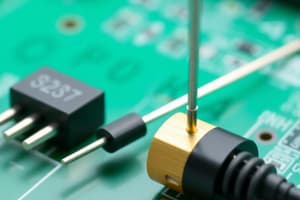Podcast
Questions and Answers
What is the main function of a photoelectric sensor in a mechatronic system?
What is the main function of a photoelectric sensor in a mechatronic system?
- To generate temperature measurements
- To measure force and strain on an object
- To detect proximity and convert it into an electrical signal (correct)
- To produce mechanical motion based on light intensity
Which type of sensor uses a junction of two unlike conductors to produce a voltage when temperature changes?
Which type of sensor uses a junction of two unlike conductors to produce a voltage when temperature changes?
- Reed switch
- Thermocouple (correct)
- Proximity sensor
- Optical encoder
What differentiates active sensors from passive sensors?
What differentiates active sensors from passive sensors?
- Active sensors can only measure position.
- Active sensors require an external power source for operation. (correct)
- Active sensors use mechanical transduction exclusively.
- Passive sensors generate output signals without any external stimulus.
What is the role of optical encoders in a measurement system?
What is the role of optical encoders in a measurement system?
Which sensor is primarily used for detecting magnetic fields and consists of two magnetic contacts?
Which sensor is primarily used for detecting magnetic fields and consists of two magnetic contacts?
In terms of energy conversion, passive sensors typically convert physical quantities into which type of output?
In terms of energy conversion, passive sensors typically convert physical quantities into which type of output?
What type of sensor detects the presence of nearby objects without direct contact?
What type of sensor detects the presence of nearby objects without direct contact?
Which sensor is best suited for measuring the positional shift of an object in real time?
Which sensor is best suited for measuring the positional shift of an object in real time?
Which statement about photodiodes is correct?
Which statement about photodiodes is correct?
What is a key characteristic of a thermistor as a temperature sensor?
What is a key characteristic of a thermistor as a temperature sensor?
Which of the following is an example of a proximity sensor?
Which of the following is an example of a proximity sensor?
What type of sensor is primarily used for detecting mechanical displacement?
What type of sensor is primarily used for detecting mechanical displacement?
Which statement is true regarding reed switches?
Which statement is true regarding reed switches?
What distinguishes an absolute position encoder from an incremental position encoder?
What distinguishes an absolute position encoder from an incremental position encoder?
Which characteristic is a common misconception about optical encoders?
Which characteristic is a common misconception about optical encoders?
What is the primary function of a phototransistor?
What is the primary function of a phototransistor?
What is essential for a thermistor's operation in relation to temperature?
What is essential for a thermistor's operation in relation to temperature?
Which feature is characteristic of the LM35 series temperature sensors?
Which feature is characteristic of the LM35 series temperature sensors?
What principle does a bimetallic strip operate on in relation to temperature changes?
What principle does a bimetallic strip operate on in relation to temperature changes?
What is a primary application of optical sensors?
What is a primary application of optical sensors?
What is a key difference between thermistors and resistance temperature detectors (RTDs)?
What is a key difference between thermistors and resistance temperature detectors (RTDs)?
Why is measuring voltage across a p-n junction preferred over measuring current?
Why is measuring voltage across a p-n junction preferred over measuring current?
How does a bimetallic strip function in a thermostat?
How does a bimetallic strip function in a thermostat?
What is one of the primary characteristics of an optical sensor?
What is one of the primary characteristics of an optical sensor?
Flashcards are hidden until you start studying
Study Notes
Sensors and Actuators
- Sensors detect physical parameters and convert them into processable signals.
- Transducers convert energy from one form to another.
- Sensors can be active (require external power sources) or passive (generate electric current without need for additional energy source).
Temperature Sensors
- Thermocouples are created by joining two dissimilar conductors.
- Thermocouples are used to measure temperature differences.
- Thermistors are semiconductor devices whose resistances change exponentially with temperature.
- Thermistors operate within narrower temperature ranges than other types of sensors.
- p-n junction temperature sensors are used because current or voltage across the junction is dependent on temperature.
- LM35 series Integrated Circuits are p-n junction temperature sensors.
- Bimetallic strips are composed of two or more metal layers with different thermal expansion coefficients.
- When heated, the deformation of the strip can be related to temperature changes.
Optical Sensors
- Optical sensors detect electromagnetic radiation across a broad range, including infrared to UV.
MEMS Technology
- MEMS (micro-electromechanical systems) technology miniaturizes electronic components.
Self-Assessment
- Sensors and transducers are not examples of actuators, and vice versa.
- Accuracy refers to the maximum expected error of a sensor or measurement.
- Thermistors produce a large, non-linear change in resistance with temperature.
- Photodiodes can be used as both photoconductive and photovoltaic sensors.
- The strain gauge shown is sensitive to horizontal strain/displacement.
- The displacement sensor shown is a potentiometer.
- The displacement sensor shown is a slotted opto-switch.
- Mechanical switches are prone to switch bounce.
- A tactile sensor is known as a pressure sensor.
- Integrated Circuits often use semiconductor-based temperature sensors.
Studying That Suits You
Use AI to generate personalized quizzes and flashcards to suit your learning preferences.




